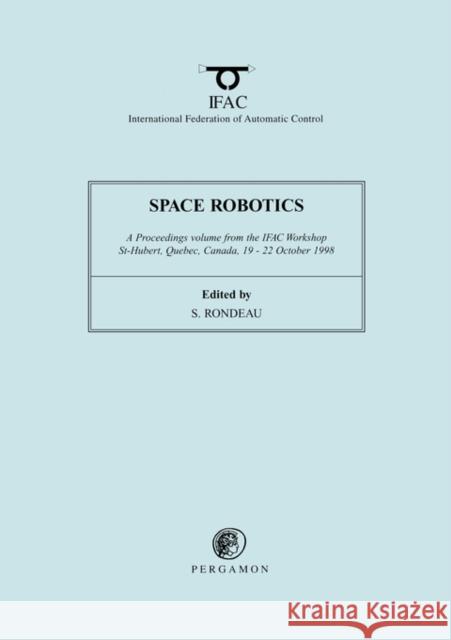Space Robotics 1998 » książka
Space Robotics 1998
ISBN-13: 9780080430508 / Angielski / Miękka / 2000 / 200 str.
This conference which was originally planned as workshop took place on October 19 to 22, 1998 in St-Hubert, Montreal. The idea of a conference devoted to Space Robotics matured when two IFAC Technical Committees, Aerospace Control and Robotics decided to co-sponsor such an event. The final decision converged with technological maturity of Space Robotics itself. It became obvious that robotics is a unique but viable technology that can be used in Space exploration. Robotics is the intelligent connection of perception to action. This broad definition of robotics encompasses both science and technology. In the early days, the changing technology in manufacturing was driving the development in robotics. New manufacturing technology required new, economical and efficient methods of production. Development was geared towards robots in the form of manipulators. In later years, the development was driven by demand in service industry, military and special applications. One of those special applications is related to Space and its exploration. The rapid development in Space related technologies brought forward questions about the need for automation technologies that would allow for operations in Space in an efficient and safe way. Some Space operations could not have possibly been done without extensive use of automation and especially robotics. There are numerous robotics meetings and conferences across the world but it became obvious that the meetings addressing particular problems in space robotics would be useful and helpful. The Program Committee tried to include in conference presentations all specific fields of robotics that are important in Space applications. On manipulators' side, kinematics, manipulation, dexterity, sensors and control systems have been covered. On mobile robots' side new control techniques, telerobotics, nonholonomic systems, and trajectory planning have been considered. Also, applications and Space operations have been reviewed. Altogether 30 papers were selected and accepted by the International Organizing Committee. Papers were presented in 8 sessions in three days. There were also three keynote speeches presented by invited speakers and three distinguished speakers to present keynote lectures on three separate occasions. Speakers were chosen in order to give a broad overview of space robotics activities in all involved countries. Participants came from Belgium, Canada, France, Germany, Italy, Japan, Netherlands, Poland, United Kingdom and the USA. In day 1, eight papers were presented in two sessions. Session 1 was related to Dextrous Robots and Session 2 to Mobile Robots (Part 1 and 2). Day 2 included a keynote speech on the topic of "Robotics and On-Board Autonomy: For What and How Far Can We Go?," followed by Session 3: Robot Controllers and Session 4: Vision Systems and Control. Day 3 consisted of 5 sessions, Session 5: Manipulation Control, Session 6: Kinematics, Session 7: Nonholonomic Systems, Session 8: Space Operation (Part 1 and Part 2).











